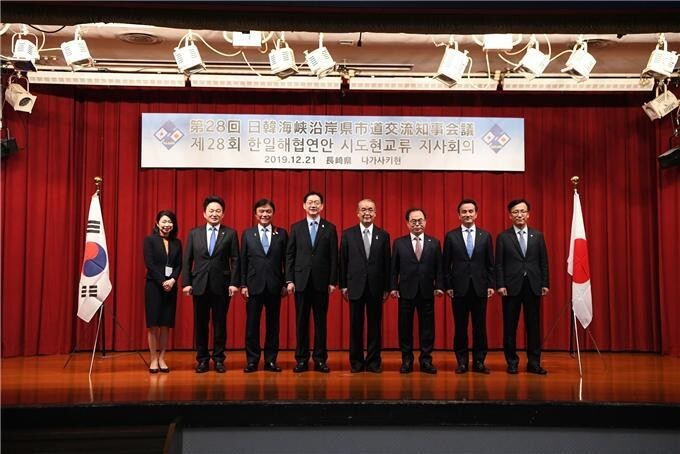Posted on : Dec.24,2019 18:08 KST
Modified on : Dec.24,2019 18:18 KST
 |
|
Busan Mayor Oh Keo-don (third from right), South Gyeongsang Governor Kim Kyoung-soo (fifth from right), and Jeju Governor Won Hee-ryong (first on left) attend the 28th session of the Korea-Japan Strait Governors’ Meeting, in Japan’s Nagasaki Prefecture on Dec. 21. (provided by the city of Busan)
|
Leaders of local Korean governments attend Korea-Japan Strait Governors’ Meeting in Nagasaki
 |
|
Busan Mayor Oh Keo-don (third from right), South Gyeongsang Governor Kim Kyoung-soo (fifth from right), and Jeju Governor Won Hee-ryong (first on left) attend the 28th session of the Korea-Japan Strait Governors’ Meeting, in Japan’s Nagasaki Prefecture on Dec. 21. (provided by the city of Busan)
|
The city of Busan, which had been the first metropolitan or provincial government in South Korea to fully cut off administrative exchange with Japan to protest its economic retaliation, has resumed administrative exchange after a six-month hiatus. Hopes that this will trigger a thaw in chilly South Korea-Japan relations clash with concerns that the move is premature.
The move was triggered by the 28th session of the Korea-Japan Strait Governors’ Meeting, in Japan’s Nagasaki Prefecture on Dec. 21-22. Since 1992, this exchange-oriented meeting has been held on a rotating basis in one of four South Korean and four Japanese regions bordering the Korea Strait. The participating regions are Busan, South Gyeongsang Province, South Jeolla Province, and Jeju Island, in South Korea, and Fukuoka Prefecture, Saga Prefecture, Nagasaki Prefecture, and Yamaguchi Prefecture, in Japan.
This year’s meeting included discussions on job creation and employment for young people. Attendees included Busan Mayor Oh Keo-don; South Gyeongsang Governor Kim Kyoung-soo, who is awaiting sentencing in a second trial in connection with an online opinion rigging scandal; and Jeju Governor Won Hee-ryong.
It was Oh’s first visit to Japan since becoming mayor in July 2018. It also came six months after his announcement in July of this year urging Japan to withdraw its economic retaliation measures and declaring that Busan would be the first of South Korea’s 17 metropolitan and provincial local governments to suspend all administrative exchange with Japanese local governments.
Commenting on his visit in a Dec. 23 Facebook post, Oh wrote, “The declaration suspending administrative exchange was about a ‘suspension for the sake of exchange,’ not a ‘suspension for suspension’s sake.’”
“The idea was that [Japan] should withdraw its unjust economic retaliation measures and that we should restore friendly relations between South Korea and Japan,” he explained.
“While it remains inadequate, we can see signs of change. I made the decision to visit in response to that,” he added, suggesting that his visit to Japan was made in consideration of Japan’s recent partial withdrawal of economic retaliation measures.
Cooperation toward events in Busan and Japan scheduled for 2020
A particularly noteworthy development was the agreement reached at the governors’ meeting, with eight South Korean and Japanese cities, provinces, and prefectures deciding to hold a “working-level meeting on youth employment” with related local governments and job-related institutions, companies, and university students taking part. They also agreed to actively support and cooperate toward seven events scheduled to take place in Japan in 2020, including the Fukuoka Motor Show and the Izuhara Port Festival on Tsushima Island, as well as four events taking place in South Korea, including the World Team Table Tennis Championships in Busan. In effect, the agreements were an announcement of full-scale exchange between South Korean and Japanese local governments.
The city of Busan has maintained a measured stance. Its concern is that critics may accuse it of rushing to resume full-scale administrative exchange at a time when South Koreans continue to boycott Japanese products and Japan tourism amid Japan’s failure to fully withdraw the economic retaliation measures it imposed in response to a South Korean Supreme Court ruling ordering compensation to survivors of forced labor conscription during the Japanese occupation. A Busan city official cautioned against reading too much into the move, saying that the city’s “principle is to respond flexibly according to the situation between the South Korean and Japanese governments.”
In July, the city announced two principles for exchange efforts with Japan, stressing its “firm stance” and “principled exchange.” This was accompanied by a decision to provisionally halt administrative exchange with Japan until bilateral relations improve and to allow private-sector exchange support efforts to continue as a matter of independent judgment while allowing the participation of only the necessary number of individuals.
By Kim Kwang-soo, Busan correspondent
Please direct comments or questions to [english@hani.co.kr]










